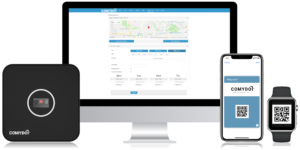
Congratulations to Uniberry! This year’s winner of the Trusted Connectivity Award at the IoT Innovation World Cup 2019 has impressed all the judges with an incredible new solution (Cido) that offers flexible access management for apartment buildings. Instead of physical keys or transponders, Cido uses barcodes, which are either already present, (e.g. on parcels for shipment tracking) or can be generated on demand to integrate them into documents or ID cards. Anyone making a delivery can scan the barcode of a parcel at the building’s main entrance when they arrive – Cido then turns the shipment itself into a temporary key.
Hot off the winning stage, we spoke to both Julian Wulf and Felix Ueckermann, Co-Founders of Uniberry, the company behind Cido, asking them about their experience taking part in the competition and their wider thoughts on connectivity and security.
What sparked the idea for Cido’s ‘Come in and drop off’ solution?
I (Julian) used to work at the Institute for Logistics and Transportation at the University of Hamburg and dealt with numerous problems and needs of parcel carriers. Felix and I realized that ordering things online only makes sense if the parcels arrive safely at home while working.
What were the toughest IoT security challenges when developing Cido?
When dealing with access management, security is mandatory and always a key topic when it comes to discussions with potential customers. We needed high availability and the right protocols to guarantee QoS. We did not want to rely solely on the security of the mobile network infrastructure itself and introduced our own security layer based on trusted encryption standards.
What are the biggest trends in IoT security you’ve noticed over the past few years?
Security in IoT products has long been neglected by developers and has led to a negative image of some connected products. Governmental regulation and certification processes might mitigate the problem but also threaten innovations. In many cases, the technical pre-requirements are already given by suppliers and only need to be set in place by developers. Security by obscurity is not an option. We must always keep in mind that every device, connected to the internet, is at risk. Use encryption wherever possible and implement OTA update mechanisms for future security requirements.
Is it easy for developers to integrate reliable connectivity and secure data exchanges when beginning work on their design?
Not exactly easy, but very possible. When selecting a critical component (such as a modem), always check for certain features such as connectivity fallback to different frequencies, off the shelf security and OTA update mechanisms. Comprehensive integration guides are helpful and should be followed carefully. A risk analysis should be conducted in advance to estimate the degree of security needed.
Can you give us an example of your typical customer and how your solution builds trust with them?
A typical customer from the professional housing industry wants to digitize their access management and used to rely on physical keys in the past. Handing out a physical key means that you cannot control or restrict the access rights anymore. Offering temporary keys is a great security benefit. As we monitor all devices, we can react to problems before the customer even notices the matter. This led to funny situations in the past when we called a customer to talk about a device being offline just to find out that an electrician switched off electricity in the building a few minutes ago. The customer was amazed about the level of service.
How do you protect the Cido ‘Come in and drop off’ solution from cyber-attack?
We attach “Do not hack” stickers…
…and implemented everything considered good practice, such as encryption wherever possible and always implement OTA update mechanisms as we’ve mentioned before. Overall, the key is to build security into the solution from the beginning; it’s the best way to protect against attacks. Security first!
So there you have it! Some useful insights from Uniberry’s finest… And if you’d like to see more of this type of innovation and competition, make sure you come to the official 10th IoT Innovation World Cup® pitch and award ceremony happening at 4YFN 2019 in Barcelona next week on the 26th February at 18:00. We’re very proud to be a partner of the Innovation World Cup® Series, the world-leading IoT competition. Here, we’ll see the world’s top 20 IoT startups and the top Catalan IoT game changers ready to compete for the top prizes.
The question is: who will go home with the trophy? If you’re coming, make sure you don’t miss out on an exclusive 20% discount with the promo code DISCOU20. Get your tickets here. More info: http://bit.ly/IOT4yfn19


